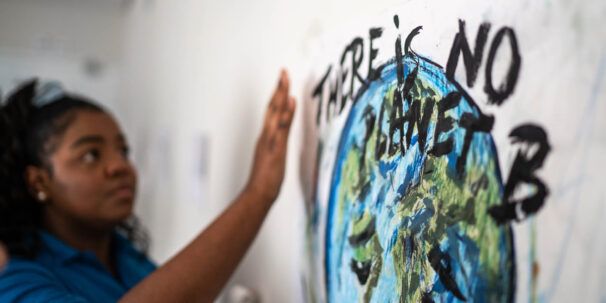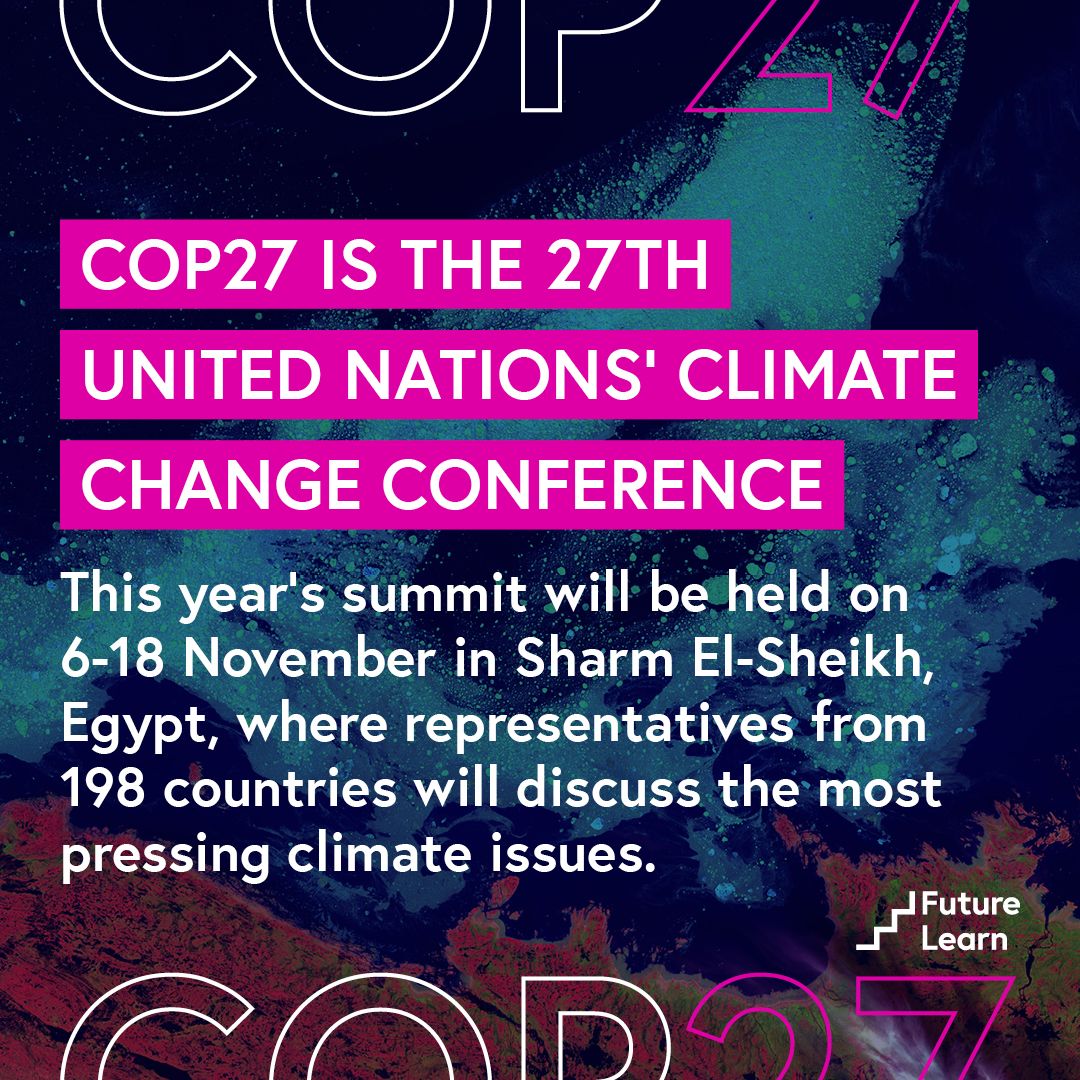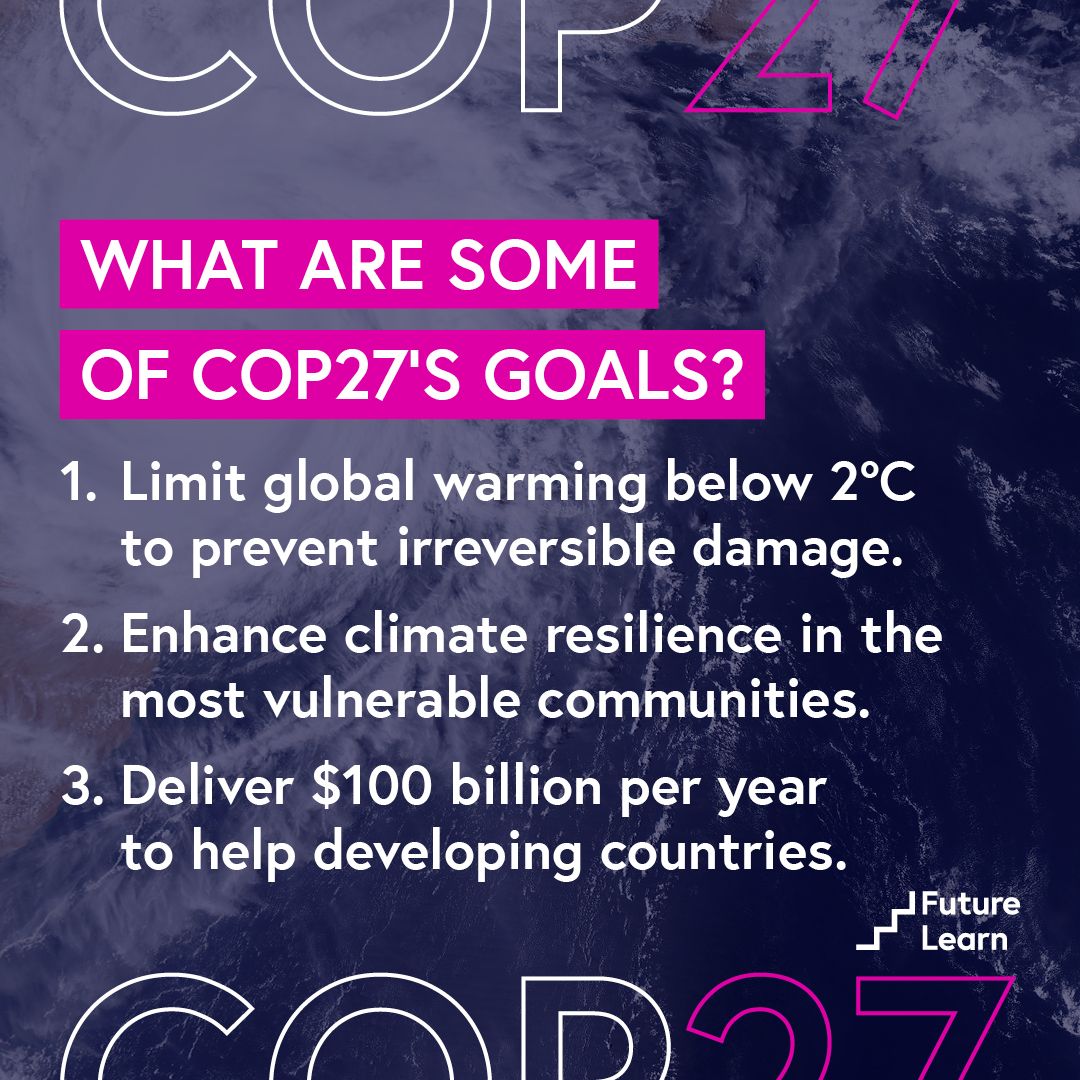[ad_1]
We explore what this year’s United Nations Climate Change Conference, COP27, is all about, why it matters and whether it can make a difference.

There can be no denying that human activities are changing the climate of our planet. Multiple studies have concluded that anthropogenic (human-made) climate change is the culprit behind the climate-warming trend observed over the past century. The UN Climate Change Conference, known this year as COP27, aims to assess the progress being made to combat climate change.
Here, we take a closer look at COP27, why it matters, the progress made so far, and whether the conference can truly make a difference. We’ll also highlight some of our environment and sustainability courses that can help you learn more about some key environmental issues.
What is COP27?
First, let’s look at what COP27 actually means. You’ve likely heard and seen the term in the media recently, as there’s a lot of buzz about the upcoming event. So, what is it?
COP27 is the 27th United Nations Climate Change Conference. Also known as the Conference of the Parties (hence the title of COP), the summit aims to address some of the vital issues surrounding climate change.
You can explore some of the global issues during COP27 and be part of the call for collective action with our Learning for a Sustainable Future: Live at COP27 course.
When is COP27, and what is the schedule?

World leaders are converging in Sharm El-Sheikh, Egypt, between 6 and 18 November. The event will see countries plan and negotiate over some of the most pressing matters relating to the climate.
As well as these negotiations, there will also be exhibitions and multiple events. There are a few important negotiation sessions taking place, including:
- Twenty-seventh session of the Conference of the Parties (COP27)
- Seventeenth session of the Conference of the Parties – serving as the meeting of the Parties to the Kyoto Protocol (CMP17)
- Fourth session of the Conference of the Parties – serving as the meeting of the Parties to the Paris Agreement (CMA4)
We’ll explore the Kyoto Protocol and Paris Agreement in more detail further down. There will also be sessions and events dedicated to environmental issues linked to areas such as finance, future generations, and gender.
Who will attend?
It’s expected that delegates and representatives from over 200 countries, businesses, organisations and faith groups will attend COP27. The main players will be representatives of The United Nations Framework Convention on Climate Change (UNFCCC), which totals 198 countries.
Some of the most high-profile world leaders include:
- President Joe Biden from the United States
- Prime Minister Rishi Sunak from the UK (who initially snubbed COP27)
- President Emmanuel Macron from France
- President Luiz Inacio Lula da Silva from Brazil (newly elected)
- First Minister of Scotland, Nicola Sturgeon
- Chancellor Olaf Scholz from Germany.
There will be other well-known attendees, too, with the likes of natural historian Sir David Attenborough planning on making an appearance. While activist Greta Thunberg attended last year, this year she declined her invitation, criticising the event for being “held in a tourist paradise in a country that violates many basic human rights”. The conference is being led by Egypt’s foreign minister, Sameh Shoukry, taking on the role of COP27 president.
However, there are some other notable absentees; King Charles from the UK, President Xi Jinping from China, Prime Minister Anthony Albanese from Australia, President Justin Trudeau from Canada, and Prime Minister Fumio Kishida from Japan won’t attend the conference.
The UN Framework Convention on Climate Change and COP27
Above, we mentioned the UNFCCC – an international environmental treaty that was established to combat human impact on the Earth’s climate. The representatives from 165 countries signed the treaty at the ‘Earth Summit’ in 1992 in Rio de Janeiro, and legislation came into force in 1994.
As explored in our open step on COP21 in 2015, those signing the treaty agreed to a framework for action. This was aimed at stabilising atmospheric concentrations of greenhouse gases (GHGs) to avoid “dangerous anthropogenic interference with the climate system.”
Since its inception, the annual Conference of the Parties (COP) has convened annually to assess how countries are implementing the UNFCCC framework. World leaders and representatives meet at these events to discuss, negotiate, and introduce new laws.
Why does the Conference of the Parties matter?
So, why is COP27 important? The Sharm el-Sheikh climate conference has already been featured in the news for months ahead of its start. Many are claiming that COP27 will be the world’s best last chance to control climate change – though the same thing was said last year, and since COP26 in Glasgow, only 29 out of 194 countries have come forward with tightened national plans.
We’ve already explored issues around climate change and sustainability in other posts. We’ve explained how greenhouse gas emissions have already damaged the Earth’s climate, and that if left unchecked, our activities will push climate change beyond its tipping point.
And, while it is possible for individuals to reduce their carbon footprint, action needs to happen on a global scale. Policymakers, governments, and organisations must act to tackle climate change. We are beyond the point where we can simply make changes to reduce our impact; as a species, we’re going to have to actively correct our mistakes.
COP27 presents a chance for world leaders to assess the current landscape, reflect on whether previous pledges have been met, and introduce new and decisive actions to reduce emissions and control climate change.
Key moments so far in the history of COP
Although the UN Climate Change Conference takes place annually (with the exception of 2020), there have been some notable milestones from previous COP events. We’ve mentioned two of these already; the Kyoto Protocol and the Paris Agreement:
- The Kyoto Protocol. The first agreement to come from the UNFCCC was the Kyoto Protocol. Although agreed upon in 1997 at COP3, it didn’t come into force until 2005, yet it set binding emission reduction targets for 36 industrialised countries and the European Union.
- The Paris Agreement. At COP21 in 2015, representatives committed to limiting global temperature rises, limiting greenhouse gas emissions to net zero between 2050 and 2100, and for wealthier countries to help poorer regions adapt to climate change and renewable energy.
What are the COP27 themes?
It’s worth taking a look at some of the themes and issues that will be discussed at COP27. These points are some of the most pressing ones related to climate change, and as well as the main negotiations, there are workshops and events related to these themes.

The key aim of the COP27 conference has been identified as ensuring full implementation of the Paris Agreement. However, that’s not the only thing being covered. Below, we’ve highlighted some of the interesting areas being covered in the COP27 schedule:
Gender
The topic of gender may not be the first thing you think of when considering climate change. However, it’s one of the themes that is going to be fairly prominent across the events and workshops of COP27.
As the UNFCCC explains on their website, women in poverty often face a greater risk and higher burden from the impacts of climate change. They’re also less likely to have equal participation in key decision-making processes and labour markets.
There will be several events throughout COP27 that will discuss issues around gender and climate change, and the official gender day is 14 November.
Finance
Another key point of discussion is that of finance in relation to climate change. There will be workshops on issues such as financial systems for net zero, responsible business conduct and climate action, and transformational economics.
Finance ministers from across the world will also meet to discuss topics such as how to deliver finance for emerging and developing markets, as well as long-term climate finance.
As we mentioned, a central aspect of the Paris Agreement was for wealthier nations to help poorer regions adapt to climate change and renewable energy. The official finance day will be 9 November
Youth and future generations
One of the big aims of COP27 this year is to ensure that future generations have a voice and the chance to engage other young people around the world in climate issues. There will be opportunities for young climate activists to open a dialogue with policy makers and practitioners.
The official day in the agenda focusing on youth and future generations will be 10 November.
Other key themes
- Science
- Decarbonisation
- Water
- Adaptation & Agriculture
- Ace & Civil Society
- Biodiversity
Can the UN Climate Change Conference make a difference?
Over the last 30 or so years, climate change has gone from a fringe issue to one of the most pressing concerns of our time. Despite pledges, commitments and legislation, it seems that all we hear about in the news is the latest climate disaster. So, can things like COP27 actually help?
The need for action is clear. Global sea levels are rising, Arctic sea ice is declining, and we’re seeing a loss of biodiversity and impacts on human health. This year, in 2022, we’ve seen some of the worst climate catastrophes that we’ve faced in years, including devastating floods, horrific droughts, and unprecedented heatwaves.
In the Paris Agreement, the nearly 200 countries who signed up committed to keeping global warming below a 2C rise from pre-industrial levels. The aim is to limit this to 1.5C, and during COP27, countries will be asked about their plans to achieve this between now and 2030.
A report published by UN Climate Change ahead of COP27 demonstrated that whilst countries are reducing global greenhouse gas emissions, efforts are not nearly enough to limit a global temperature rise to 1.5 degrees Celsius by the end of the century.
At this year’s conference, we can expect to see further steps that countries will take, as well as a formal declaration. We could see commitments to reducing fossil fuels, protecting vulnerable ecosystems, and adding more protection for those who are vulnerable to climate change.
Whether or not current or future rules will be enough to avert a climate disaster remains to be seen.
Criticisms of COP27
Although, on paper, the UN Climate Change Conference seems to have made progress, the results so far have been mixed. What’s more, there are questions over whether COP27 will be effective.
Recent reports have shown that climate financing is falling short of the $100 billion per year pledge made in recent years. Furthermore, plans to cut carbon are falling short of what’s needed to keep temperature rises under 1.5C, and greenhouse gas levels reached new highs in 2020.
Similarly, leaked documents show that countries including Australia, Japan and Saudi Arabia are trying to play down the need to move away from fossil fuels. Combine this with the notable absence of the leaders of China, Australia and Japan, and it’s easy to see why there are concerns about how effective it will be.
In addition, The Guardian cite an ‘explosion’ in number of fossil fuel lobbyists at the COP27 climate summit as being an issue. There are over 600 lobbyists from the oil and gas indistries attending, and this has led to concerns that COP27 is merely a greenwashing event that largely serves the interest of those who want to INCREASE the number of fossil fuels being burned in order to serve their own political and economic interests.
This is in opposition to COP27’s supposed goal of reducing emissions and reaching net zero, as is desperately needed.
Should COP27 be held in Egypt?
There have also been criticisims of the COP27 conference being held in a luxury resort in Egypt, a country without a great human rights record. Greta Thunberg tweeted, “We stand in solidarity with prisoners of conscience in Egypt & joined @copcivicspace petition urging Egypt to open civic space and release everyone arbitrarily detained ahead of #COP27,”.
A gay White House advisor and his partner also called on the UN to hold the conference elsewhere, citing fear that LGBTQIA+ activists and other attendees might be targeted by security forces in Sharm el-Sheikh if they attended talks.
Jerome Foster and Elijah Mckenzie-Jackson wrote to the UN, stating that the decision “places our life in danger in the process of advocating for the life of our planet” due to Egypt’s “LGBTQ+ torture, woman slaughter and civil rights suppression”.
Final thoughts
We are living through a critical period in history, where our actions as individuals and nations could well impact generations to come. How kindly our future societies will judge us is still within our hands, but we have to make events such as COP27 effective.
The effects of climate change are here already and will only continue to worsen if we don’t make a concerted effort to save our planet. Policymakers and world leaders have a responsibility to take action, but we elect those leaders. Similarly, many of us are lucky enough to choose our choices and actions when it comes to living a sustainable and responsible life.
[ad_2]
Source link
